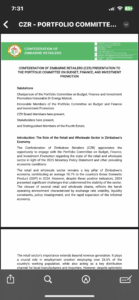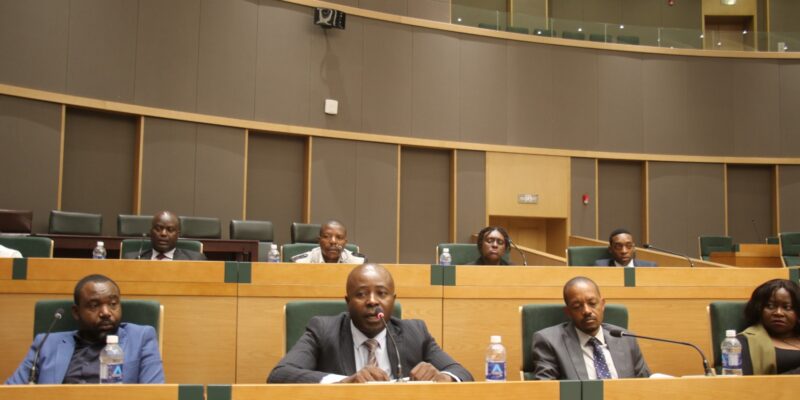Dr Denford Mutashu, President of the Confederation of Zimbabwe Retailers (CZR) has on behalf of the retailers urged the Zimbabwe government to reduce digital transaction costs by 50%.
Speaking exclusively to TechnoMag after meeting with parliament, the Confederation OF ZIMBABWE RETAILERS (CZR) PRESENTATION TO THE PORTFOLIO COMMITTEE ON BUDGET, FINANCE, AND INVESTMENT PROMOTION made it categorically clear that it will be a win win situation for both retailers and customers if government moves in to deduce costs associated with digital transacting.
 *By Ross Moyo*
*By Ross Moyo*
Mutashu told the Chairperson of the Portfolio Committee on Budget, Finance and Investment Promotion Honorable Dr Energy Mutodi, and other Honorable Members of the Portfolio Committee on Budget and Finance and Investment Promotion
Including CZR Board Members present,
Stakeholders present,
and Distinguished Members of the Fourth Estate, that
“CZR, therefore, urges the government to collaborate with financial institutions to significantly reduce digital transaction costs possibly by 50%, including lower merchant fees and subsidized POS acquisition programs for small businesses.”
Mutashu added that, “While POS adoption is an important step, formalizing the economy requires a more comprehensive approach.”
He also cited Intermediated Money Transfer Tax IMTT as a bone of contention which should be reduced and capped attractively to encourage digital payments and not discourage their use.
“Alignment of Monetary and Fiscal Policies: The Urgent Need for IMTT Reduction
The CZR has consistently advocated for better alignment between monetary and fiscal policies, particularly regarding taxation on transactions. The high Intermediated Money Transfer Tax (IMTT) continues to discourage the use of digital payment systems, pushing many businesses and consumers towards cash-based transactions,” said Dr Mutashu in his remarks.
“CZR strongly pleads for the reduction of IMTT to 1% on USD transactions and its complete removal on ZiG transactions. The dual-taxation system, where businesses already face VAT and other statutory obligations, makes IMTT an additional burden that reduces competitiveness.”
The CZR President made his case that “Eliminating IMTT on ZiG transactions would significantly boost financial inclusion, encourage formal business operations, and promote the broader adoption of electronic payment systems as well as confidence in the local currency.”
Dr Mutashu praised the mandatory use of reduced costs on swipe machines.
“Mandatory Point-of-Sale (POS) Machines: A Step Towards Formalization
The mandatory adoption of Point-of-Sale (POS) machines is a significant step towards economic formalization, enhancing transparency and improving tax compliance within the retail and wholesale sector. CZR supports this initiative, as it encourages digital transactions, reduces cash dependency, and promotes financial inclusion. However, the high cost of digital transactions remains a critical barrier to widespread adoption. Many businesses, particularly SMEs and informal traders, struggle with excessive transaction fees, high bank charges and maintenance costs for POS systems. If not addressed, these financial constraints could discourage compliance and hinder the effectiveness of the initiative.”
Dr Mutashu said CZR, therefore, in light of IMTT and other factors urges the government to collaborate with financial institutions to significantly reduce digital transaction costs possibly by 50%, including lower merchant fees and subsidized POS acquisition programs for small businesses.
While POS adoption is an important step, formalizing the economy requires a more comprehensive approach. The rapid growth of the informal sector remains a pressing concern, as an increasing number of businesses operate outside the tax net, creating unfair competition for compliant retailers and wholesalers.
CZR therefore proposed the introduction of a Simplified Tax Model based on a tiered system that aligns tax obligations with business size and turnover. This model would allow small informal businesses to gradually integrate into the formal economy through a structured tax framework with lower entry barriers. Such an approach would incentivize compliance while ensuring a broader tax base, ultimately benefiting government revenue collection without overburdening smaller enterprises.
By reducing transaction costs and implementing a practical tax structure that accommodates businesses of all sizes, Zimbabwe can accelerate formalization efforts, create a level playing field, and support sustainable growth in the retail and wholesale sector.















Comments